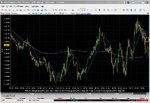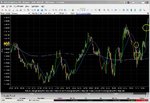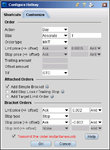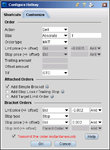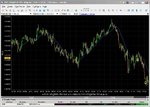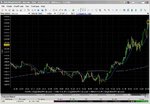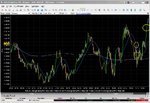More on trading like a sniper...
After finding Netto's web site, called "One shot one kill", I got curious and did a search on google: "
trader like a sniper".
I found some people who've had just my same idea, and I'll quote some interesting concepts (in bold the ones I can relate to the most), after providing the link:
http://traderfeed.blogspot.com/2008/05/trading-like-sniper-blending-aggression.html
I outlined how a trader's very achievement motivation can lead to "pressing": trying so hard to make trades happen that trading plans and rules are abandoned. This often happens when traders become frustrated with losses or slow markets and try to make up for the lack of results by sizing positions too aggressively or by taking too many positions. Traders press when they feel pressure, whether for profits, for action, or to achieve competitive advantage over other traders.
The result is a loss of self-control, as aggressiveness takes over and judgment takes a back seat. Successful trading may be discretionary or system-based, but it should always be rule-governed: controlled by basic considerations of risk management and opportunity. Indeed, this might be an apt definition of poor trading: when the need to trade overwhelms the need to preserve and add to capital.
One of my favorite posters in my office is of a military sniper in the field, peering out from ground cover. The caption beneath the picture reads, "The sniper's greatest weapon is a sharply honed intellect. He combines a mastery of stealth, situational awareness, ballistics and precision shooting skills into one of the most lethal weapon systems to ever strike fear into the enemy."
If the sniper became too aggressive and excessively bored with sitting in the field waiting for the right shot, he might leap from his cover and begin spraying the enemy with fire. Most of the shots would probably go wild, and the out-of-control sniper would quickly be located and mowed down.
No, the sniper waits for the ideal shot: "stealth" and "situational awareness" are essential tools of the trade. Being a sniper means combining aggression with exquisite self-control and judgment. It is controlled aggression.
Over the years, I've learned to trade like a sniper by not placing one trade after another in rapid succession. When a trade is concluded, I go flat and wait for a fresh setup. During the waiting time, I refresh my "situational awareness" (assessment of market conditions, my own condition), and return to my basic trading rules.
The idea is to trade only when I have an unobstructed view of the target. Everything else is waiting and preparing, staying low in a defensive posture. It's the time between those shots at the target that provide the self-control. It is difficult to press if you take the time to reassess, reload, and return to cover after an errant shot. With repetition, that reassessment and reloading become automatic: your default mode becomes one of self-control.
Plan. Trade. Reassess plan. Trade: It's a rhythm that combines the best of achievement motivation and aggression with the best of judgment and forethought. It's a beautiful feeling to plan one good trade, execute it to perfection, and then sit back and wait for the next opportunity. Any performance skill, honed and executed with precision, is a kind of work of art. I think the best snipers understand that.
http://traderfeed.blogspot.com/2008/04/perils-of-achievement-motivation-when.html
A deadly pattern among some of the best traders is to channel achievement motivation into trading *more*.
The best traders do have a strong achievement motivation and work quite hard at their craft. That achievement drive makes them hate losing. Their impulse is to go for the jugular; they want to not only achieve, but achieve *more*.
This drive can be a trader's greatest weakness, however. It can lead to stubborness in taking losses, leading to outsized losses. It can also lead to overtrading, as the driven trader attempts to *make* things happen. That is a particular recipe for disaster on slow, narrow days such as yesterday, when it's easy to get chopped up jumping aboard seeming trending moves.
The net result is that *pressing* to achieve can take the trader out of his or her game. It subverts risk management by leading the trader to trade too large, without careful attention to stop loss points. It also interferes with decision-making by leading the trader to take trades without an objective edge.
The link itself says it all in this case "sniper-training-the-cure-for-over-trading" (in
red what applied to me):
http://www.thecrosshairstrader.com/2009/05/sniper-training-the-cure-for-over-trading/
One of the trader’s biggest psychological barriers to overcome is over trading. Of course, over trading is relative depending on the type of trader you are and the time frame(s) used to make trading decisions. However, if you have a well formulated trading plan, you will know from past experience when you are walking the line between planned trading and over trading.
Here are some of the symptoms of over trading:
1. not sticking to a plan or system
2. taking trades for no clear reason
3. taking on larger than normal positions
4. second guessing your system
5. jumping the gun (entering a trade in anticipation of an affirmative signal/pattern)
6. obligatory trading (if I am not in a trade, then I am not working)
The underlying cause of over trading is purely a lack of confidence either in yourself and/or your system. If you truly believe that your trading strategy provided X number of highly probable trades over X number of days, then why would you waste your energy (and capital) taking high risk, low probability trades? The answer: lack of confidence. The solution: think and train like a sniper.
According to the dictionary a sniper is a skilled military shooter detailed to spot and pick off enemy soldiers from a concealed place using long-range small arms. The word originates from the snipe, a game bird difficult for hunters to sneak up on.
Looking at just the statistics, more is not necessarily better when seeking to kill an enemy soldier on the battlefield. Here are the stats when looking at the ratio of bullets fired to enemies killed in several major wars:
WAR BULLETS FIRED TO KILL ONE ENEMY SOLDIER
WWII 25,000 TO 1
KOREA 50,000 TO 1
VIETNAM 200,000 TO 1
And the sniper’s stats: 1.3 bullets to kill an enemy soldier!
Charles Sasser, in his book ONE SHOT-ONE KILL, says of the sniper: “In stalking the enemy like big game hunters, these marksmen live out the philosophy that one accurate shot, one bullet costing a few cents, fired with deliberate surgical precision is more deadly and more effective against an enemy than a one thousand-pound bomb dropped indiscriminately” (2).
Let’s contrast, then, the symptoms of over trading as described above and the discipline of the sniper. According to the Sniper Training Field Manual No. 23-10, successful sniping is based on:
1. highly accurate rifle fire against enemy targets
2. the development of basic skills to a high degree of perfection
3. repetitiously practicing the basic skills until mastered
4. highly specialized training to ensure maximum effectiveness with minimum risks
Due to his detailed training for a specific task, the sniper is confident in his ability to perform his sole duty: to kill the enemy with one bullet under stressful conditions over and over again. Building confidence, then, is a product of consistent behavior and sustained success.
In like fashion the trader builds confidence by staying focused on a highly accurate rules based methodology via repetition. This methodology has proven to be highly successful when followed with a high degree of perfection, thereby, ensuring maximum return with minimum risks.
In other words, follow strict rules that provide a high probability of success and in so doing you will have the confidence to carry out your plan under various market conditions. The result will be a rising equity curve.
What's really interesting and surprising to me is that in all these 12 years, despite the fact that I am such an obsessive maniac and perfectionist, I never realized that I could apply myself obsessively,
with the same gun, to learning how to take shots at a given market (the EUR for example). In 12 years by now I'd be getting a 90% accuracy. Instead of obsessively focusing on something, which is what I usually do with everything I do, in this case I made an unfortunate exception: I kept changing. I kept changing financial instruments (which was a good thing, because futures are the best), I kept changing methods, and I kept changing underlying markets. Why? Simple, because I wasn't making money. So I kept on changing guns trying to find the gun that would get me to hit the targets, whereas all I had to do is learn to use
one gun. It wasn't the guns that were wrong: it was me who wasn't aiming properly. I was just shooting my bullets away (like the above quote: thousands of bullets wasted per target), without even taking the time to aim. Then I'd switch weapons. But most of all: I never did any free target practice with paper trading, which is available to anyone. It's unbelievable how stupid I was, given my habit of obsessively practicing one thing over and over again, and how I didn't do it in this field. To be forgiven, I must remind myself that in trading you know you're not making money, but you don't know what's wrong: no one will tell you "you're using the best gun in the world, so there's something wrong with you". So you keep on changing gun. As I said earlier: all you have to do is get a gun (bracket order of 20 ticks in both directions), and you just keep practicing and you can't help but get better - as long as markets are not random and they aren't. It's as simple as aiming at anything, or learning any musical instrument. At the beginning you'll get 50% accuracy, unless you have a tendency like me to go against the trend: in that case you'll get a 10% accuracy, but you'll immediately know you're doing the wrong thing. Then you'll immediately reverse your bet, and get a 90% accuracy or something like that. I don't know - maybe I am exaggerating, but you get my point. What one must not do is use a gun that doesn't have a stoploss. Say something like a take profit of 20 ticks, and stoploss unknown. How are you going to learn with that, if on your first mistake you're dead? That's like a gun exploding in your hands.
But one thing is true and it must be said: if you don't have the patience and you allow yourself to shoot without first focusing, you won't stay a good shot, and could get worse and unlearn things. The more you'll focus, the better shot you will be. I remember I was quite good at playing pool. But I played well depending on my mood. If I was upset (best if upset at the other player) and very serious, I played great because of the great effort and focus. If I was in an easygoing mood, I played awfully because I didn't care about winning. So I guess if I'll allow myself to shoot more than once a day, I'll focus less on the shot, no matter how good I'll get at shooting, and I could still miss and lose my ability to hit the target. But, with rules implemented, your aim can only worsen so much, because the rules you have in place already guarantee a certain degree of accuracy. I'd say my rules guarantee by themselves about 60% accuracy, but with my effort and focus I could be 80% accurate. I'll see in the coming days. For now I've noticed how I am being profitable for the first week of my trading life. And I also have a good feeling of non-recklessness when I trade.
More quotes... I found the book by that Charles Sasser:
http://www.amazon.com/exec/obidos/ASIN/0671682199/awoccomthewriterA/#noop
You can read it on amazon for free, by clicking on "(
more)" so I took a snapshot of something I liked (in particular, "he never fired more than one shot a day..."):

